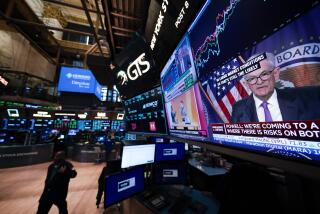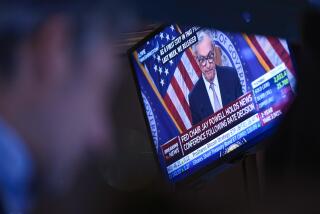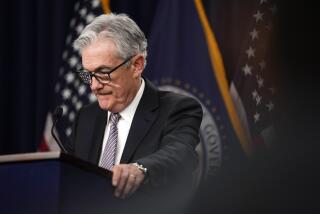Europe central bank chief adds to uncertainty
European Central Bank President Jean-Claude Trichet added to uncertainty about euro-zone monetary policy Monday, saying he would not commit to any interest rate decisions before a rate-policy meeting next week.
Answering questions after a speech in Budapest, Hungary, Trichet noted that his Aug. 2 policy stance, in which he called for “strong vigilance” to stem inflation, was articulated before recent credit worries triggered unusual market volatility.
He said the central bank would wait until its meeting scheduled for Sept. 6 before deciding what to do next.
“We will then have to assess all of the elements of the economy,” he said. “We will assess the risks and will take the appropriate steps at that moment.”
Trichet’s remarks added to market expectations that central banks might take further steps to fend off a credit squeeze.
Before the recent market turmoil, financial markets had expected Trichet to increase the European Central Bank’s benchmark rate next week by a quarter of a point to a six-year high of 4.25%.
“It seems as if Trichet is preparing the markets for leaving rates unchanged in September,” said Mark Meadows, market strategist at Tempus Consulting in Washington.
“The ECB was initially very committed to raising rates next month,” he added, “but in light of the volatility in the stock markets and the amount of cash they had to pump [in] to keep the system working in the past couple of weeks, it would be very surprising to see if they are still going for a hike.”
The ECB and Federal Reserve injected emergency funds this month into banking systems to prevent credit markets from seizing up in the wake of widening credit problems first triggered by defaults on U.S. sub-prime mortgages.
Markets are expecting the Fed’s policymaking committee to cut the U.S. federal funds rate, which is paid by banks when they borrow overnight from other banks, at its Sept. 18 meeting. That rate currently is 5.25%, which is where the Fed has held it since June 2006.
With that in mind, investors are likely to watch closely when Fed Chairman Ben S. Bernanke speaks Friday at the agency’s annual conference in Jackson Hole, Wyo. His theme -- on housing and monetary policy -- will be particularly timely.
“Markets really need to hear from Bernanke what his assessment of the crisis is and how serious it is and if he thinks there will be more bad news,” said Joseph Tan, market strategist at Fortis Bank in Singapore.
The euro fell Monday after Trichet’s remarks, extending losses against the dollar and the yen.
Germany has borne the brunt of the European fallout from problems stemming from sub-prime U.S. home loans as two of its banks have almost collapsed, requiring major bailouts.
The German state of Saxony said Sunday that it would sell its stricken lender SachsenLB to Stuttgart-based LBBW, the largest state-owned German bank.
Finance Ministry spokesman Torsten Albig said the acquisition of SachsenLB would lead “to a strengthening, not a weakening,” of the banking sector in Germany. But the announcement nonetheless kept investors on edge Monday.
Jean-Claude Juncker, chairman of the euro zone’s group of finance ministers, said in an interview published Monday that the U.S. home loan crisis would not have a severe effect on the European Union economy.
More to Read
Inside the business of entertainment
The Wide Shot brings you news, analysis and insights on everything from streaming wars to production — and what it all means for the future.
You may occasionally receive promotional content from the Los Angeles Times.










